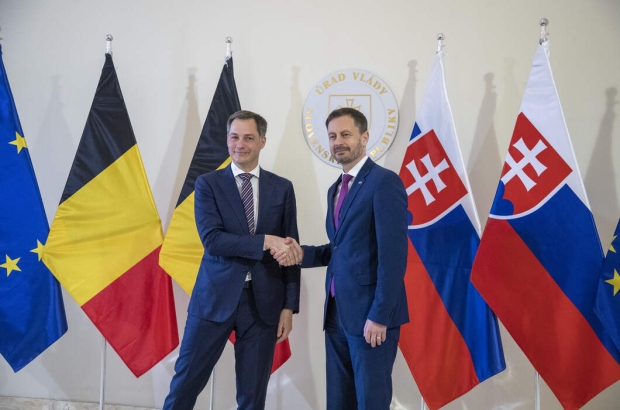- Daily & Weekly newsletters
- Buy & download The Bulletin
- Comment on our articles
De Croo begins 'solidarity' tour of countries on Ukraine's borders
Belgian prime minister Alexander De Croo began a three-day mission to Eastern Europe on Monday which will take him to Slovakia, Poland, Romania and Moldova, RTBF reports.
The trip takes place against the backdrop of the continuing war in Ukraine as its neighbouring countries look on with concern. De Croo said he would deliver a message of solidarity to these countries, which are at the forefront of a conflict that is shaking the European continent.
Since 24 February, European states have redoubled their efforts to provide a coordinated response to the Russian invasion of Ukraine. On Monday, the 27 EU foreign ministers met in Brussels to consider a sixth package of sanctions. At the heart of the debate was the issue of energy supplies. The EU has set itself the target of drastically reducing its dependence on Russian oil and gas. However, for some of the countries De Croo is visiting, this issue is even more critical.
Call for EU solidarity in maintaining sanctions against Russia
Slovak prime minister Eduard Heger told De Croo on his arrival that Slovakia would need time to find alternatives to Russian supplies and that his country required European cooperation and solidarity. "If we want to disconnect from Russian gas, we have to work together," Heger said at a press conference.
While Belgium is less dependent on Russian gas, Alexander De Croo said he understood Slovakia’s position. "This is a conflict that could last for months or even years." In his view, the sanctions against Russia must meet three criteria: to be borne by all 27 EU Member States, to be sustainable, and to be proportionate, added the prime minister.
"The sanctions must affect Russia and as little as possible the European economy,” he said. “We must not push Europe into a recession that would be terrible. When countries like Slovakia tell us that they need time to adapt, we have to hear them."
Debate on Ukraine's accession to the EU
The Slovak prime minister also called for Ukraine's early integration into the European Union. He recalled the case of his country which, after failing with its application in 1999, made a new bid in 2001 and became a member of the EU in 2004.
"Ukrainians are showing the utmost courage,” Heger said. “They know that they are a part of Europe and want to be a part of Europe. I believe in Ukrainians, I trust them, I know they are capable of doing it and they deserve to do it."
Belgium, like other Western European countries, was more cautious about Ukraine's accession to the EU. It did not want "shortcuts", concerned that some of the problems of the functioning of the union had their origin in an integration process that has sometimes been too fast.
Alexander De Croo repeated this reservation on 31 March, when Ukrainian president Volodymyr Zelensky addressed the Belgian parliament. But to make Ukraine wait until the formal process of EU membership would be a "terrible mistake", he explained, before pleading for accelerated economic integration of the EU and Ukraine.
The Belgian prime minister left for Poland after visiting Slovakia for discussions with Polish prime minister Mateusz Marowiecki.
EU sanctions compared to weakening vaccine
Marowiecki, a hardliner when it comes to sanctioning Russia, pleaded for more “crushing” sanctions and said that the Russian rouble was now back to pre-war levels. He compared EU sanctions to a vaccine that eventually becomes ineffective as the virus learns how to adapt.
The Polish prime minister did not mince his words with regard to the regime of Russian president Vladimir Putin, describing it as "fascist and totalitarian", calling the struggle against him a fight between "good and evil". He also spoke of the atrocities that have come to light in recent weeks. "The Russian army is leaving behind the evidence of its crimes," he said.
Central to the talks between De Croo and Eastern European leaders will be the issue of refugees. About 300,000 Ukrainians who fled the war went through Slovakia and 2.5 million to Poland.
Marowiecki asked for help from Poland’s European partners, explaining that Poland has not set up refugee camps, but is trying to integrate the refugees into its society. However, reception facilities have been installed in various places. The two heads of government visited one of these initiatives in Serock, near Warsaw. They spoke to some refugees, almost exclusively women, children and the elderly.

















